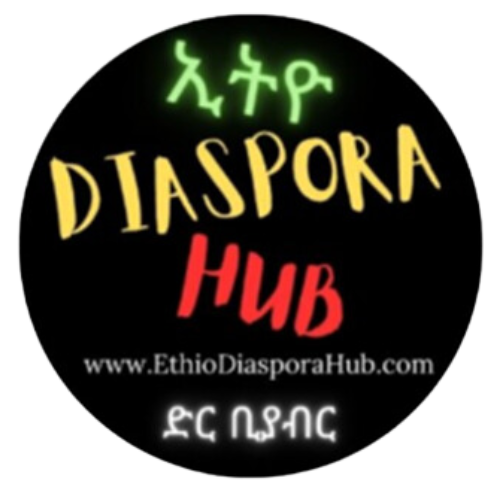Address system of Saudi Arabia
- Address system of Saudia Arabia
- Postal codes
- Administrative regions
- Address elements
- Name
- Neighborhood
- City
- Postal code
- Governorate
- Country
- Address Example
- Geographic Information system
- Online address verification
Address system of Saudi Arabia
Saudi Arabia has an official address system for various purposes, including mail delivery, government documentation, and location identification. The address system in Saudi Arabia has undergone significant improvements in recent years to streamline services and enhance the accuracy of mail and package deliveries. Here’s a detailed explanation of the Saudi Arabian address system:

Postal Codes: Saudi Arabia is divided into postal code regions, and each area or neighborhood is assigned a unique postal code. These codes play a crucial role in identifying the location of an address. Postal codes typically consist of five digits and are used to specify the general area or district of an address.
Administrative Regions: Saudi Arabia is divided into 13 administrative regions, each with its governorate (emirate) or province. These regions include Riyadh, Makkah, Madinah, Eastern Province, Asir, Tabuk, Hail, Northern Borders, Al-Qassim, Jizan, Najran, Baha, and Al-Jouf. The regional division is also essential in addressing mail and identifying the broader location.
Address Elements: A typical Saudi Arabian address includes several key elements, which may vary in format and detail depending on the location and the specific needs of the sender or recipient. These elements generally include:
Name: The name of the recipient or addressee.
Street Name/Number: The name of the street or road and the building or house number, if applicable.
Neighborhood: The name of the neighborhood or district.
City: The city or town where the address is located.
Postal Code: The unique postal code for the area.
Governorate: The province or region in which the address is situated.
Country: Saudi Arabia, as the country name.
Examples: A sample Saudi Arabian address might look like this:
John Doe 123 Main Street, Apartment 456 Al-Malaz District Riyadh 12345 Riyadh Province Saudi Arabia
In this example, “John Doe” is the recipient, “123 Main Street” is the street address, “Apartment 456” is the specific location within the building, “Al-Malaz District” is the neighborhood, “Riyadh” is the city, “12345” is the postal code, “Riyadh Province” specifies the region, and “Saudi Arabia” indicates the country.
Geographic Information System (GIS): Saudi Arabia has also implemented a Geographic Information System (GIS) to enhance the precision of address information. This system utilizes GPS coordinates, detailed maps, and digital mapping tools to locate and identify specific addresses accurately. It is essential for emergency services, logistics, and navigation.
Online Address Verification: Many online services and government agencies in Saudi Arabia provide tools for address verification and lookup. These services allow users to input an address or postal code to verify its accuracy and identify the correct location.
Saudi Arabia’s official address system is continuously evolving to improve service quality, accuracy, and accessibility. This is especially important as the country grows and develops, with new neighborhoods and infrastructure being built. By combining postal codes, regional divisions, and detailed address elements, the system helps ensure efficient mail and package delivery and effective location identification.

Immigration Status and Benefits in Saudi Arabia
- Know Your Immigration Status
- Immigration Benefits
Immigration Status in Saudi Arabia
Knowing your immigration status is of paramount importance for newcomers in Saudi Arabia. It not only determines your legal rights and responsibilities within the country but also plays a crucial role in your day-to-day life. Understanding your immigration status ensures that you can access essential services, such as healthcare, education, and employment, without any legal barriers. It also helps you avoid potential legal complications and penalties related to visa violations.
Being aware of your status enables you to plan for your stay, make informed decisions regarding residency permits and work permits, and ensure you are compliant with Saudi Arabia’s immigration regulations. Ultimately, having a clear grasp of your immigration status is fundamental for newcomers to navigate the complexities of living and working in the country while enjoying the rights and protections to which they are entitled.
Saudi Arabia has various immigration statuses for newcomers, each with its own set of requirements and privileges. here are some of the common immigration statuses for newcomers in Saudi Arabia:
Green Card: The Permanent Residency, also known as the Green Card program, in Saudi Arabia is a relatively new initiative introduced in 2022 to attract foreign investors, entrepreneurs, and highly skilled professionals. It offers long-term residency and certain privileges, including the ability to own property, engage in business activities, and reside in the country on a more permanent basis. This program is aimed at boosting the Saudi economy by encouraging foreign talent and investments. It represents a significant shift in Saudi Arabia’s immigration policies, providing an opportunity for eligible individuals to establish a more lasting presence in the country.
Resident Visa: A Resident Visa in Saudi Arabia is a common immigration status for newcomers planning to live and work in the country. It includes subcategories like Employment Visa, Dependent Visa, Investor Visa, and Student Visa. An Employment Visa is typically sponsored by a Saudi employer for foreign workers, allowing them to work legally in the country. Dependent Visas enable the family members of foreign workers to join them in Saudi Arabia. Investor Visas are for individuals who invest in the Saudi economy, and Student Visas are issued to foreign students studying in Saudi educational institutions. These visas are critical for expatriates to establish legal residency in Saudi Arabia.
Visit Visa: A Visit Visa in Saudi Arabia is designed for non-residents who intend to visit family members or friends in the country. This visa is typically sponsored by a Saudi resident or citizen who invites the visitor and assumes responsibility for them during their stay. Visit visas can have varying validity periods, allowing for short or extended stays, and they are generally used for family reunions, holidays, or other personal visits to the Kingdom of Saudi Arabia. It’s essential to adhere to the specific visa conditions and comply with Saudi Arabia’s immigration regulations while on a visitor visa.
Hajj and Umrah Visa: Hajj and Umrah Visas in Saudi Arabia are specialized visas for Muslims intending to visit the country for religious purposes. The Hajj Visa is issued to those planning to undertake the annual Hajj pilgrimage, one of the Five Pillars of Islam. The Umrah Visa is for individuals who wish to perform the lesser pilgrimage known as Umrah at any time of the year. Both visas are typically provided through authorized travel agents and are subject to specific regulations and quotas set by the Saudi government. These visas allow visitors to enter Saudi Arabia solely for religious activities and have limited durations to accommodate the pilgrimage and related rituals.
Diplomatic and Official Visas: Diplomatic Visas in Saudi Arabia are issued to foreign diplomats, embassy staff, and consular officials representing their respective countries in the country. These visas grant diplomatic immunity and privileges to enable them to perform their diplomatic duties. Official Visas, on the other hand, are provided to government officials and representatives of international organizations visiting Saudi Arabia for official business or events. Both types of visas are subject to international diplomatic protocols and are usually arranged through diplomatic channels and government-to-government agreements.
https://gulfvisa.com/visa-services/saudi-arabia/diplomatic-visa/
Tourist Visa: Tourist Visas in Saudi Arabia are temporary permits designed for individuals wishing to visit the country for tourism, business meetings, or family visits. These visas typically have specific validity periods, varying from a few days to several months, depending on the purpose of the visit. Tourist visa holders are not authorized to work while in the country and are expected to depart once their visa expires. The application for a tourist visa may require sponsorship by a Saudi host, such as a family member or a Saudi-based organization, and it’s essential to adhere to the rules and regulations associated with the visa to ensure a smooth and legal stay in Saudi Arabia.
Please note that immigration policies and specific visa categories in Saudi Arabia can change over time, so it’s crucial to check with the relevant Saudi Arabian government authorities or consulates for the most up-to-date information on immigration statuses and visa requirements.
Immigration Benefits
Immigration to Saudi Arabia offers various benefits to newcomers, depending on their specific immigration status and purpose of entry. Some general immigration benefits for newcomers in Saudi Arabia include:
Employment Opportunities: Saudi Arabia has a thriving job market, particularly in industries such as oil and gas, construction, healthcare, and technology. Expatriates who secure employment visas can access these opportunities, and many receive competitive salaries, tax-free income, and benefits such as housing and healthcare provided by their employers.
Economic Opportunities: The Saudi government actively encourages foreign investment and entrepreneurship. Investors and business owners can benefit from incentives, including access to Special Economic Zones, streamlined business registration processes, and opportunities to participate in the country’s economic diversification efforts through Vision 2030.
Quality of Life: Saudi Arabia boasts a modern infrastructure, world-class healthcare facilities, and high-quality education institutions. Expatriates and their families can enjoy a comfortable lifestyle, with access to amenities like shopping malls, restaurants, and recreational activities.
Cultural and Historical Experience: Saudi Arabia is a land of rich heritage, traditions, and historical significance. Newcomers have the opportunity to explore historical sites, and museums, and experience the local culture and traditions.
Religious and Pilgrimage Benefits: Muslims can undertake the Hajj and Umrah pilgrimages, which are significant religious journeys. Pilgrims have the opportunity to visit the holy cities of Mecca and Medina, fulfilling a fundamental religious obligation.
Permanent Residency: As of 2022, Saudi Arabia introduced the Green Card program, offering permanent residency to select categories of individuals. Green card holders enjoy the benefits of long-term residency and can engage in various economic and social activities, including property ownership and business ventures.
Family Reunification: Many visa categories in Saudi Arabia allow for family reunification. Expatriates can sponsor their spouses, children, and other dependents to live with them in the country, enhancing family life and support.
Access to World-Class Education: Saudi Arabia offers a range of international and local educational institutions, including universities, schools, and vocational training centers. Expatriate children can access quality education, often in English or other foreign languages, preparing them for future opportunities.
Healthcare Services: Saudi Arabia has a well-developed healthcare system with modern hospitals and medical facilities. Expatriates usually have access to quality healthcare services, whether provided by their employers or through the public healthcare system.
Tax Benefits: One of the significant financial advantages of living in Saudi Arabia is the absence of income tax on individuals. This tax-free income allows expatriates to retain a larger portion of their earnings.
It’s important to note that the specific benefits and conditions may vary depending on the type of visa and the individual’s circumstances. Additionally, immigration policies and regulations may change over time, so newcomers should stay informed and consult with relevant authorities for the latest information on immigration benefits in Saudi Arabia.
Your Essential Documents
- Your Essential Documents
- Passport
- Work Permit
- Valid Visa
- Health insurance
- Driving License
- Legalized Documents
- Medical Report
- Employment Letter
Essential Immigrant Documents
Understanding your essential documents is of paramount importance for newcomers in Saudi Arabia. These documents, which typically include your passport, visa, and residency permit, are the foundation upon which your legal status and identity in the country rest. They serve as proof of your eligibility to reside, work, and access essential services within the country. Failing to grasp the significance of these documents can lead to legal complications, deportation, or difficulties in everyday life.
Being well-informed about the validity, renewal processes, and any specific regulations related to these documents is crucial to ensuring a smooth and legal transition to life in Saudi Arabia. Moreover, it fosters a sense of security and confidence, as it empowers newcomers to navigate bureaucracy, obtain necessary services, and fully participate in the vibrant and diverse society of Saudi Arabia.
Passport: The passport is an essential immigrant document for newcomers in Saudi Arabia, serving as a foundational piece of identification and documentation for anyone seeking to enter and reside in the country. It is not only a prerequisite for obtaining a visa but also a crucial form of identification while in Saudi Arabia. Newcomers must ensure that their passport is valid for at least six months beyond their intended stay and has sufficient blank pages for visa stamps. It is the primary document used to establish one’s identity, and without a valid passport, individuals would not be able to apply for visas or residency permits, travel within the country, open bank accounts, or engage in various legal and administrative transactions. Therefore, safeguarding and maintaining the validity of one’s passport is of utmost importance when embarking on the immigration journey to Saudi Arabia.
https://www.my.gov.sa/wps/portal/snp/servicesDirectory/servicedetails/9212
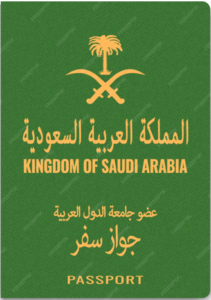
Work Permit (Iqama): The work permit, commonly known as the “Iqama,” is an essential immigrant document for newcomers in Saudi Arabia, particularly those arriving for employment purposes. The Iqama serves as both a residence permit and a work permit, allowing expatriates to legally reside and work in the country. It is typically sponsored by the employer, who applies for it on behalf of the employee. The Iqama includes critical personal information, such as the holder’s name, date of birth, nationality, and job details. It also serves as the primary identification document for expatriates during their stay in Saudi Arabia. The Iqama is vital for accessing essential services like opening bank accounts, obtaining a driver’s license, and enrolling in healthcare, making it a fundamental document that ensures legal and authorized status for newcomers in the Kingdom.
https://www.my.gov.sa/wps/portal/snp/servicesDirectory/servicedetails/14787
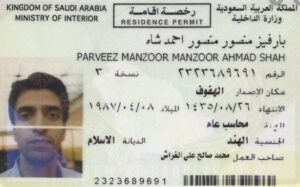
Valid Visa: A valid visa is a fundamental and essential immigrant document for newcomers in Saudi Arabia. Whether you are entering the country for employment, family reunification, business, or any other purpose, obtaining the appropriate visa is a prerequisite for legal entry and residence. Different types of visas are available, such as employment visas, family visit visas, business visas, and student visas, each tailored to the specific purpose of your visit. To acquire a visa, applicants typically need to meet certain requirements, such as sponsorship from an employer or a family member, provide the necessary documentation, and comply with the regulations set by the Saudi Arabian government.
https://visa.visitsaudi.com/Home/TermsConditions
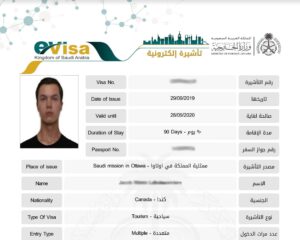
Health Insurance: Health insurance is an essential immigrant document for newcomers in Saudi Arabia, particularly for those arriving on employment visas. It serves as a crucial component of the comprehensive expatriate healthcare system in the country. Saudi Arabia mandates that employers provide health insurance coverage to their foreign employees, ensuring access to medical services, including doctor’s consultations, hospitalization, and emergency care. This insurance not only safeguards the well-being of newcomers but also complies with legal requirements. It acts as a safety net, offering financial protection in the event of unexpected health issues or accidents. Without adequate health insurance, newcomers might face difficulties accessing healthcare services, making it a vital document to secure a smooth and secure transition to life in Saudi Arabia.
https://chi.gov.sa/en/Pages/default.aspx

Driving License: A driving license is considered an essential immigrant document for newcomers in Saudi Arabia, particularly for those who plan to drive while residing in the country. Saudi Arabia has stringent traffic regulations and a robust system for issuing driving licenses. Newcomers, whether expatriate workers or residents, often need to obtain a Saudi driving license to legally operate a vehicle. While expatriates can use an international driving permit (IDP) temporarily, obtaining a local Saudi driving license is advisable for long-term residents as it is the only legally recognized form of driving license in the country. The process of obtaining a Saudi driving license typically involves taking a driving test, attending driving school, and providing the necessary documentation, which can include your residence permit, passport, visa, and sometimes a no-objection certificate from your employer or sponsor. Newcomers need to familiarize themselves with the specific requirements and procedures for obtaining a Saudi driving license to ensure they comply with local regulations and can drive legally in the country.
https://www.my.gov.sa/wps/portal/snp/servicesDirectory/servicedetails/8174
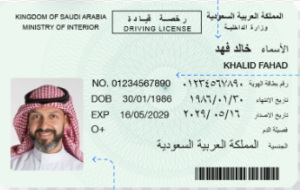
Legalized Documents: Saudi Arabia seeking to establish its legal status in the country. These documents, which often include personal certificates such as marriage certificates, birth certificates, and educational qualifications, must undergo a rigorous authentication process in the newcomer’s home country and subsequent attestation by the Saudi Arabian embassy or consulate. The purpose of this procedure is to verify the authenticity and legal validity of the documents, ensuring that they meet the stringent standards required by the Saudi authorities. These legalized documents are typically submitted as part of the visa application process and are a fundamental component of the immigration and residency system in Saudi Arabia, serving to establish an individual’s legal identity and credentials within the country. They play a pivotal role in various aspects of life, including employment, family reunification, and educational pursuits, making them essential for newcomers navigating the complex Saudi Arabian immigration landscape.
Medical Report: The medical report is an essential immigrant document for newcomers in Saudi Arabia. It serves as a critical component of the visa application process, especially for those coming to the country for employment or other long-term purposes. This report typically includes a comprehensive medical examination, including a blood test, chest X-ray, and other health assessments to ensure that the applicant does not pose a health risk to the local population. The results of the medical report are submitted to the Saudi authorities as part of the visa application, and they play a crucial role in determining the applicant’s eligibility to enter and work or reside in the country. This stringent health screening process is in place to safeguard public health and prevent the spread of contagious diseases. Newcomers should be prepared to undergo these medical assessments as part of the immigration procedure when relocating to Saudi Arabia.
https://www.harleyhealthcentre.com/visa-medicals/saudi-arabia
Employment Letter: An employment letter is a vital immigrant document for newcomers in Saudi Arabia. This official document, typically issued by the employing company or organization, serves as a formal job offer and outlines the terms and conditions of your employment. It provides essential details such as your job title, salary, work responsibilities, contract duration, and any other employment-related agreements. The employment letter is not only crucial for securing the appropriate employment visa but also plays a significant role in the immigration process, as it substantiates your purpose for entering the country. Moreover, it serves as a critical reference point for labor rights, ensuring that both the employer and the employee adhere to the mutually agreed-upon terms and conditions throughout the employment period. Without a valid and properly documented employment letter, newcomers may face challenges in obtaining the necessary work permits and visas to legally reside and work in Saudi Arabia.
Understanding Your Finance in Saudi Arabia
- Understanding your finance
- Employment types
- Paycheck
- Direct Deposit
- Payroll Taxes
- Tax Returns
- Banking Cards
Understanding your finance
Understanding your finances is crucial for newcomers in Saudi Arabia for several reasons. Firstly, Saudi Arabia’s financial landscape has its unique features, such as the absence of income tax and a heavy reliance on government subsidies for various services. This means that newcomers need to grasp the local taxation system and be aware of how these subsidies can impact their cost of living and financial planning. Secondly, having a clear understanding of your finances ensures that you can budget effectively and make informed decisions about expenses, savings, and investments. This is especially important as newcomers may face initial challenges like adapting to a new currency and currency exchange rates.
Additionally, a sound financial understanding helps individuals navigate the intricacies of opening bank accounts, obtaining credit, and managing their finances within the country’s regulatory framework. Ultimately, being financially literate in Saudi Arabia is essential for newcomers to build a stable and secure future in this vibrant and economically dynamic nation.
Understand employment type: Understanding employment types is crucial for newcomers in Saudi Arabia due to their impact on their legal status, job security, and overall well-being. Saudi Arabia offers various employment options, including full-time, part-time, contract, and freelance work, each with its unique rights and responsibilities. Familiarity with these types is essential for newcomers to make informed choices, ensuring they receive proper compensation, benefits, and legal protections. Additionally, comprehending the Saudi labor market’s intricacies can help newcomers navigate the complex visa and residency processes, ensuring they remain in compliance with Saudi labor laws. This knowledge not only enhances their overall work experience but also contributes to their successful integration into Saudi society, fostering a more secure and harmonious environment for both newcomers and the local community.
https://connectresources.ae/guides/saudi-arabia-work-visa-types

Paycheck: For newcomers in Saudi Arabia, a paycheck holds paramount significance as it serves as the fundamental means for sustenance and livelihood. Saudi Arabia has been a popular destination for expatriates due to its growing economy and numerous employment opportunities, particularly in sectors like oil, construction, healthcare, and technology. These newcomers often rely on their paychecks not only to cover basic living expenses but also to support their families back in their home countries. Additionally, the Kingdom’s culture and lifestyle, while vibrant, can be relatively expensive, making a consistent and timely paycheck essential for meeting day-to-day financial needs and achieving a good quality of life. Furthermore, financial stability is closely tied to an individual’s legal status in the country, making regular paychecks crucial for maintaining legal residency and ensuring a smooth transition into Saudi society. In essence, the importance of a paycheck for newcomers in Saudi Arabia cannot be overstated, as it represents their economic lifeline and a key factor in their successful integration into this dynamic and diverse nation.
https://immedis.com/global-payroll-glossary/saudi-arabia/#payroll
Direct deposit: Payroll direct deposit is significant for newcomers in Saudi Arabia for several reasons. Firstly, it offers a secure and convenient method for receiving their salaries, eliminating the need for physical checks or cash payments, which can be risky and inconvenient. This is especially vital for newcomers who may not yet be familiar with local banking infrastructure and may face challenges in accessing traditional financial services. Direct deposit ensures timely and reliable payment, reducing the risk of late or missing salaries, which can be particularly stressful for newcomers trying to settle into a new country. Furthermore, it promotes financial inclusion by encouraging newcomers to open bank accounts, helping them establish a financial footprint, and access a wider range of banking services. Overall, payroll direct deposit streamlines the payment process, enhances financial security, and supports the integration of newcomers into the Saudi Arabian financial system, ultimately contributing to their overall well-being and successful adaptation to their new environment.
https://www.my.gov.sa/wps/portal/snp/aboutksa/ePayment/?lang=en
Payroll Taxes: Payroll tax deposits hold significant importance for newcomers in Saudi Arabia as they play a crucial role in ensuring compliance with the country’s tax regulations and social security system. Saudi Arabia has specific tax laws that require both employers and employees to contribute to various funds, such as the General Organization for Social Insurance (GOSI), which provides benefits like healthcare and pensions. For newcomers, understanding and fulfilling these obligations is essential to avoid legal issues, and penalties, and to secure access to vital social services. Accurate and timely payroll tax deposits also contribute to the overall economic stability and development of Saudi Arabia, as they support the country’s infrastructure and social welfare programs. Compliance with these tax regulations demonstrates a commitment to integrating into the local workforce and upholding one’s responsibilities as a contributing member of Saudi society, ultimately fostering a positive and inclusive environment for newcomers.
https://payslip.com/resources/blog/saudi-arabia-global-payroll-tax-information-guide
Tax Returns: Tax returns are of paramount importance for newcomers in Saudi Arabia as they play a crucial role in ensuring compliance with the country’s tax laws and regulations. Understanding and properly filing tax returns is not only a legal obligation but also a key aspect of financial stability and integration into Saudi Arabian society. For expatriates and newcomers, this process provides transparency and accountability in their financial affairs, helping them avoid legal consequences and financial penalties. Additionally, filing tax returns can facilitate access to various government services and benefits, such as healthcare and education, while also establishing a credit history, which is vital for securing loans or making significant financial transactions. It also contributes to the overall economic development of the country by supporting government revenues and public services. In essence, tax returns serve as a fundamental tool for newcomers in Saudi Arabia to navigate the financial landscape, uphold their legal responsibilities, and fully participate in the country’s economic and social fabric.
https://taxsummaries.pwc.com/saudi-arabia/individual/taxes-on-personal-income
Bank Cards: Bank cards are of paramount importance for newcomers in Saudi Arabia for several reasons. First and foremost, they provide individuals with a secure and convenient means of accessing and managing their finances in a new and unfamiliar environment. Bank cards allow newcomers to make cashless transactions, including shopping, dining, and bill payments, reducing the need to carry large amounts of cash, which can be risky. Additionally, having a bank card is essential for accessing a wide range of financial services, such as setting up utility payments, receiving salaries, and transferring funds to and from their home countries. Furthermore, these cards often come with benefits like rewards programs and fraud protection, offering newcomers peace of mind and additional financial incentives. Overall, bank cards are a critical tool in helping newcomers integrate into the Saudi Arabian financial system and ensure their financial stability in a foreign land.
https://www.globaldata.com/store/report/saudi-arabia-cards-and-payments-market-analysis/
Debit Card: Debit cards play a crucial role for newcomers in Saudi Arabia for various reasons. Firstly, they provide a convenient and secure method for managing day-to-day financial transactions, allowing individuals to make purchases, withdraw cash from ATMs, and pay bills without the need to carry large sums of cash. This is particularly valuable for newcomers who may not be familiar with the local currency and denominations. Debit cards also offer a level of financial inclusion, enabling individuals to access their bank accounts easily, even if they haven’t established a full credit history in the country. Furthermore, they provide a record of financial transactions, which can be essential for budgeting and financial planning. In Saudi Arabia, where the financial sector is highly developed, debit cards are widely accepted, making them an indispensable tool for newcomers to navigate their daily financial needs and integrate into the local economy.
https://www.marketresearch.com/Euromonitor-International-v746/Debit-Cards-Saudi-Arabia-32797958/
Credit Card: Credit cards are significant to newcomers in Saudi Arabia for several reasons. First and foremost, they provide a convenient and secure means of payment, allowing individuals to make purchases, pay bills, and access essential services without the need for large amounts of cash. This can be especially valuable for expatriates who may not be familiar with local currency and banking systems. Additionally, credit cards offer newcomers an opportunity to establish a credit history in the country, which is crucial for gaining access to various financial services and products, such as loans and mortgages. A positive credit history can also be a valuable asset for future financial stability and investment opportunities. Moreover, credit cards often come with perks and rewards, such as cashback, discounts, and travel benefits, which can help newcomers save money and enhance their overall quality of life. Finally, the responsible use of credit cards can contribute to building a strong financial foundation and promoting financial literacy among newcomers, enabling them to make informed financial decisions and plan for their future in Saudi Arabia.
Transportation in Saudi Arabia
- Overview of the Transportation System in Saudi Arabia
- Transportation Modes
Overview of the Transportation System in Saudi Arabia
The transportation system in Saudi Arabia has witnessed a profound and dynamic transformation in recent years, reflecting the nation’s commitment to modernization and economic diversification. As the largest country in the Arabian Peninsula, Saudi Arabia has invested substantially in developing a comprehensive transportation network to connect its vast and diverse regions. A cornerstone of this transformation is the extensive road infrastructure, with a rapidly expanding network of highways, expressways, and modern roadways that span the entire country. This development has significantly reduced travel times between major cities, enhanced connectivity, and promoted economic growth by improving accessibility to remote areas.
Moreover, Saudi Arabia boasts a well-established and rapidly growing aviation sector. The kingdom is home to several world-class international airports, with King Khalid International Airport in Riyadh and King Abdulaziz International Airport in Jeddah being two of the busiest in the region. These airports offer top-notch facilities, services, and connectivity to international destinations, contributing to Saudi Arabia’s status as a major aviation hub. The national carrier, Saudi Arabian Airlines (Saudia), plays a pivotal role in connecting the country with global destinations, further strengthening the kingdom’s position in the global aviation landscape.
Public transportation has also witnessed significant developments, particularly in the capital city of Riyadh, which introduced the Riyadh Metro, a massive urban rail project comprising multiple lines that enhance the mobility of residents and visitors while reducing traffic congestion and air pollution. This ambitious endeavor underscores the commitment to creating a sustainable and efficient urban transportation system. Furthermore, high-speed rail projects are on the horizon, connecting cities and regions and providing faster and more convenient modes of intercity travel.
Saudi Arabia’s strategic location along the Red Sea and the Arabian Gulf has given rise to world-class seaports like Jeddah Islamic Port and King Abdulaziz Port in Dammam, both of which play a pivotal role in facilitating the import and export of goods and have contributed significantly to the nation’s economic growth. These ports serve as vital trade gateways, handling a substantial portion of the country’s cargo, thus fostering international trade and furthering economic development in their respective regions.
The future of transportation in Saudi Arabia is marked by a commitment to innovation and sustainability. The kingdom is actively exploring emerging technologies such as autonomous vehicles, electric mobility, and smart transportation solutions to create safer, more efficient, and eco-friendly transportation systems. Additionally, Saudi Arabia’s ambitious Vision 2030
program aims to diversify the economy, promote tourism, and enhance infrastructure, which will likely result in further advancements and investments in the transportation sector.
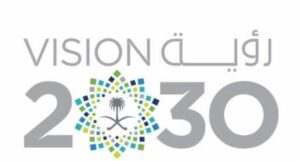
Transportation Modes
The country boasts a well-developed road network with an emphasis on personal vehicles, taxis, and ride-sharing services. Public transportation is on the rise, exemplified by the Riyadh Metro, providing a sustainable alternative for urban commuters. Buses and trains are also key components of the public transport system. Saudi Arabia’s aviation sector is thriving, with world-class airports and domestic airlines connecting the nation to the rest of the world. Maritime transportation plays a significant role, given its strategic coastal location, with top-notch seaports facilitating trade and commerce. The country is increasingly focusing on modernizing its transportation infrastructure to align with its Vision 2030 program, which includes initiatives for sustainable and technologically advanced transportation modes.
Here are the primary transportation modes in Saudi Arabia:
Personal Vehicles: Personal vehicles are a dominant mode of transportation in Saudi Arabia, reflecting the country’s high rate of car ownership and vast network of well-maintained roads. Many Saudi citizens and residents heavily rely on their cars for daily commuting and travel. The country’s love for automobiles is evident in the wide range of vehicles, from luxurious sedans to rugged SUVs, seen on the roads. Personal vehicles offer flexibility and convenience, allowing individuals to travel at their own pace and schedule. However, the dependence on personal cars has also led to challenges such as traffic congestion and environmental concerns. To address these issues, the Saudi government has been investing in public transportation and encouraging initiatives to promote the use of more sustainable and eco-friendly modes of travel while still respecting the cherished role of personal vehicles in the country’s transportation landscape.
Taxis: Taxis are readily available in major cities and are recognizable by their distinct appearance, often in White, Green, or other distinct colors. Many taxi services in Saudi Arabia have adopted modern conveniences, such as mobile apps for booking, improving the overall experience for passengers. Taxis are commonly used for point-to-point travel within cities and airport transfers. They offer a more personalized and flexible alternative to public transportation, making them a valuable component of the country’s transportation ecosystem, particularly for those who do not own personal vehicles.

Ride-Sharing Services: Ride-sharing services have made a notable impact on Saudi Arabia’s transportation landscape, offering a convenient and efficient alternative to traditional taxis. Apps like Uber and Careem have gained significant popularity in the country, providing users with an easy means of booking rides and reducing the hassle of hailing taxis on the street. Ride-sharing services have not only modernized the way people move around Saudi cities but have also contributed to improving passenger safety and transparency in pricing. They offer a range of vehicle options, from standard rides to more premium services, catering to various passenger needs. In a country where personal vehicles have traditionally dominated transportation, ride-sharing services have provided a compelling and sustainable urban mobility solution, making them an integral part of the transportation modes available in Saudi Arabia.
The notable Ride-Sharing Service providers in Saudi Arabia are:

Metro: The introduction of metro systems in Saudi Arabia represents a significant leap forward in the country’s transportation infrastructure. The Riyadh Metro, in particular, is a flagship project that showcases the nation’s commitment to modernizing its urban transportation. With multiple lines crisscrossing the city, the Riyadh Metro not only eases traffic congestion but also promotes sustainable and efficient commuting. The integration of cutting-edge technology, modern stations, and eco-friendly initiatives, such as energy-efficient trains, makes it a model for urban transit. The success of the Riyadh Metro has sparked plans for metro systems in other major cities, marking a transformative shift towards more eco-friendly, convenient, and streamlined urban transportation modes in Saudi Arabia.

Buses: The country has invested in modernizing its bus network to enhance the convenience and comfort of passengers. In Riyadh, for instance, a comprehensive bus system complements the Riyadh Metro, offering commuters a multi-modal transportation solution. Buses are not only an affordable option for residents but also cater to the needs of tourists, connecting key attractions and business districts. As Saudi Arabia continues to prioritize the development of public transportation, buses serve as a fundamental component in improving urban mobility and reducing traffic congestion, making them an integral part of the nation’s evolving transportation modes.
SAPTCO, the Saudi Public Transport Company (الشركة السعودية للنقل الجماعي), is the national bus company in Saudi Arabia. They have urban bus routes in Jeddah and Riyadh. SAPTCO also runs an extensive network of intercity bus transport throughout Saudi Arabia. For long-distance journeys, tickets are available through SAPTCO’s website, at a ticketing agent, or through SAPTCO’s mobile app.

Trains: The introduction of high-speed rail projects, such as the Haramain High-Speed Railway, has transformed intercity travel by significantly reducing travel times between major urban centers like Mecca, Medina, and Jeddah. These projects not only promote efficient and comfortable travel but also address environmental concerns by reducing the carbon footprint of transportation. Saudi Arabia’s continued investments in passenger rail systems reflect a commitment to providing residents and visitors with sustainable, reliable, and swift transportation options, positioning trains as a pivotal part of the nation’s evolving transportation modes.

SAR (Saudi Railway Company), also known as “Saudi Railways,” is a state-owned enterprise that operates a vast rail network in Saudi Arabia. The rail network connects industrial areas, mines, and ports, facilitating the efficient transport of commodities. Additionally, SAR has contributed to the economic growth of the nation by boosting trade and reducing the strain on road transportation. The company has ambitious plans for expanding its network and introducing passenger services, further highlighting its importance as a cornerstone of Saudi Arabia’s evolving transportation infrastructure.

Ferries: Ferries hold a distinct role in Saudi Arabia’s transportation system, primarily along its extensive coastline along the Red Sea and the Arabian Gulf. These vessels offer both transportation and leisure options, connecting islands, and coastal cities, and serving the needs of both residents and tourists. Ferries play a vital role in improving connectivity, particularly in areas where bridges or roads may be impractical or costly. Moreover, they contribute to the development of tourism and recreation by offering picturesque journeys and access to beautiful coastal destinations. In cities like Jeddah and Al Khobar, ferry services have become a popular choice for residents and visitors seeking an alternative and scenic mode of transportation. Saudi Arabia’s recognition of the importance of maritime transportation ensures that ferries will continue to be integral to the country’s diverse and evolving transportation modes.
Some of the ferry service providers in Saudi Arabia included:
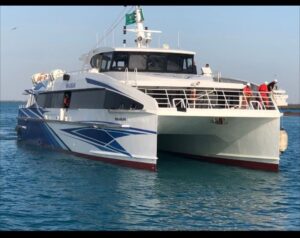
Air Transportation: Air transportation is a vital and dynamic mode of travel in Saudi Arabia, playing a pivotal role in connecting the country to the rest of the world. The nation boasts several world-class international airports, including King Khalid International Airport in Riyadh, King Abdulaziz International Airport in Jeddah, and airports in other major cities. These airports offer state-of-the-art facilities and services, serving as essential gateways for both domestic and international travelers. Domestic airlines, such as Saudia (Saudi Arabian Airlines), operate an extensive network of flights, making it convenient for passengers to access various regions of the country. The accessibility and efficiency of air travel have made it a preferred choice for those traveling long distances within the vast expanse of Saudi Arabia, contributing significantly to the nation’s economic growth and global connectivity.
Saudi Arabia boasts an extensive network of airports in major cities, making it easy for passengers to reach various regions of the country. Domestic airlines, such as Flyadeal, Flynas, and others, provide frequent and reliable flight options to connect cities like Riyadh, Jeddah, Dammam, and more. This mode of transportation is especially crucial in a country as vast as Saudi Arabia, where distances between major urban centers can be significant.
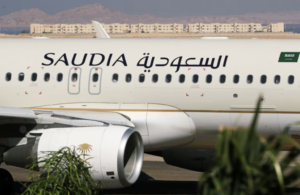
Health Care Insurance
- Health Care Insurance Coverage in Saudi Arabia for Newcomers
Health Care Insurance Coverage in Saudi Arabia for Newcomers
Healthcare insurance coverage in Saudi Arabia is a vital consideration for newcomers to the country. The Kingdom places a significant emphasis on providing accessible and high-quality healthcare services to both its citizens and expatriate residents. Saudi Arabia offers a comprehensive healthcare system, both in the public and private sectors and health insurance plays a crucial role in ensuring that residents have access to medical care when needed.
For newcomers, having health insurance coverage is often mandatory as part of their residency and work visa requirements. This insurance, provided by the employer, typically covers a range of medical services, including doctor visits, hospitalization, surgeries, prescription medications, and emergency care. Employers usually share the cost of insurance premiums with their employees.
In Saudi Arabia, the public healthcare system, operated by the Ministry of Health, offers medical services to both citizens and expatriates at government-run hospitals and clinics. However, private healthcare facilities are also widely available and offer more specialized and often more comfortable services, although they can be more expensive. Having health insurance allows newcomers to access the private healthcare sector with more ease, ensuring timely and often more convenient medical care.
Newcomers need to understand the terms and coverage of their health insurance policies, including any co-pays, deductibles, and limitations. While the quality of healthcare in Saudi Arabia is generally high, insurance coverage can help manage the cost of medical services, which can vary widely between public and private providers.

Certainly, here are the key points or components regarding health care insurance in Saudi Arabia for newcomers:
Mandatory Requirement: The mandatory requirement of healthcare insurance for newcomers in Saudi Arabia underscores the Kingdom’s commitment to providing accessible and high-quality healthcare services to both its citizens and expatriate residents. It is a legal necessity, typically imposed as part of the employment contract and residency visa requirements, and is essential for ensuring access to healthcare services in the country. Employers play a pivotal role in facilitating this requirement, with many of them arranging health insurance for their employees, often sharing the associated costs. This mandatory coverage encompasses a wide range of medical services, including doctor’s visits, hospitalization, surgeries, prescription medications, and emergency care.
Employer-Sponsored: In Saudi Arabia, healthcare for newcomers is typically employer-sponsored, and this arrangement underscores the country’s commitment to providing comprehensive and accessible medical services to its expatriate workforce. Employers play a pivotal role in ensuring that their employees have access to healthcare by providing health insurance coverage. The costs of this coverage are often shared between the employer and the employee. This employer-sponsored healthcare not only aligns with Saudi labor laws but also contributes to the overall well-being and productivity of the expatriate workforce. It ensures that newcomers have access to essential medical services, including doctor’s visits, hospitalization, surgeries, prescription medications, and emergency care, while also providing peace of mind and financial protection for employees and their families.
Comprehensive Coverage: Health insurance policies typically encompass various aspects of healthcare, including doctor’s visits, hospitalization, surgical procedures, diagnostic tests, prescription medications, and emergency care. This comprehensive coverage aims to provide individuals and their families with a safety net for their medical needs, enhancing peace of mind during their stay in the Kingdom. Whether it’s routine check-ups, specialized treatments, or unforeseen medical emergencies, newcomers can rely on their health insurance to meet their healthcare requirements. This wide-ranging coverage underscores the Kingdom’s commitment to offering top-tier healthcare services to its residents.
Varied Providers: Healthcare for newcomers in Saudi Arabia offers a diverse range of service providers, both in the public and private sectors. The public healthcare system, under the oversight of the Ministry of Health, is known for its high standard of care and provides services to citizens and expatriates alike. Public hospitals and clinics are available throughout the country, offering a wide range of medical services. On the other hand, the private healthcare sector is well-developed and provides specialized and often more comfortable services. Many expatriates, particularly those with health insurance, prefer private hospitals and clinics for their medical needs. The availability of varied healthcare providers allows newcomers to choose services that best suit their needs and preferences.
Private Healthcare: The Kingdom boasts a robust private healthcare sector, characterized by specialized services and a high standard of care. For many expatriates, particularly those with health insurance, private hospitals and clinics are the preferred choice for their medical needs. These facilities offer a more personalized and comfortable healthcare experience, with shorter waiting times and access to specialized medical expertise. Private healthcare providers in Saudi Arabia are often equipped with state-of-the-art technology and offer a broad spectrum of medical services, making them a preferred option for many newcomers.
Understanding Policies: Health insurance policies vary depending on the provider and the terms negotiated by the employer. Newcomers need to take the time to thoroughly comprehend the details of their health insurance, including co-pays, deductibles, coverage limitations, and the scope of medical services included. This understanding empowers individuals and families to make informed decisions about their healthcare and to effectively manage their medical expenses. By being well-informed about their health insurance policies, newcomers can navigate the healthcare system with confidence, ensuring that they receive the necessary medical care while also making the most of their coverage.
Legal Requirement: To comply with Saudi regulations, newcomers must possess health insurance coverage. This insurance is typically arranged by employers as part of the employment contract and residency visa requirements. It is not just a formality but a legal obligation designed to guarantee that all residents, regardless of their nationality, have access to healthcare services. This legal requirement aligns with Saudi labor laws and reflects the Kingdom’s commitment to offering quality healthcare to all those residing within its borders.
Access to Quality Care: The Kingdom boasts a robust and well-developed healthcare system that offers high standards of medical care. Health insurance, often provided by employers, is the key to ensuring that newcomers and their families can access this quality care. Whether it’s routine check-ups, specialized treatments, or unforeseen medical emergencies, health insurance guarantees that individuals have the necessary financial and logistical support to meet their healthcare needs. This access to quality care contributes to the well-being and peace of mind of newcomers, knowing that they can rely on a healthcare system that prioritizes their health and safety.
Peace of Mind: The Kingdom’s commitment to accessible and high-quality healthcare, coupled with mandatory health insurance, ensures that individuals and their families are well-protected in terms of their medical needs. Knowing that they have financial and logistical support for healthcare services, newcomers can navigate their lives in the Kingdom with a sense of security. This peace of mind extends beyond the assurance of timely and quality medical care; it also alleviates concerns about the financial implications of healthcare expenses. As a result, newcomers can focus on their professional and personal endeavors, confident in the knowledge that they are well-covered in the event of illness or medical emergencies.
Consult with Employer: Employers typically play a central role in arranging healthcare insurance for their employees as part of the employment contract and residency visa requirements. To make the most of this benefit and ensure comprehensive coverage, newcomers should have open and clear communication with their employers regarding the specifics of their health insurance policies. This includes understanding the extent of the coverage, any co-pays, deductibles, and limitations, as well as the process for accessing healthcare services. Such communication can help newcomers make informed decisions about their health and provide them with the necessary knowledge to effectively utilize their health insurance.


Dos and Don’ts
- Newcomer Dos
- Newcomer Don’ts
Newcomer Dos
For newcomers in Saudi Arabia, adhering to a few professional dos is essential for a successful transition and a positive experience in the country. Firstly, it’s important to familiarize yourself with the local culture and customs, as respect for Saudi traditions is highly valued. Dressing modestly and by local norms, particularly for women, is crucial. Punctuality is a must, as meetings and appointments are typically expected to begin on time. Building strong professional relationships through networking and maintaining open and courteous communication is vital. Additionally, being adaptable and demonstrating patience in navigating bureaucratic processes and business dealings is essential, as Saudi Arabia has a unique business environment. Embracing cultural diversity, understanding local work ethics, and learning the Arabic language, even at a basic level, can further enhance your professional experience in the Kingdom.

Adhering to certain professional dos can help ease their transition and foster positive relationships in the workplace:
Cultural Awareness: Recognizing and respecting the local culture and customs is not only a sign of courtesy but also essential for building strong professional relationships. Learning about Saudi Arabian traditions, Islamic practices, and societal norms is fundamental. It’s important to dress modestly, especially for women, and abide by local dress codes. Observing etiquette during religious holidays and respecting prayer times is also expected. Furthermore, understanding the significance of hospitality and the role it plays in business meetings and interactions is paramount. By showing cultural awareness and respect, newcomers not only integrate more effectively into the Saudi workplace but also create an atmosphere of trust and collaboration with their local colleagues, making their professional experience in the Kingdom more successful and fulfilling.
Dress Code: The kingdom has a conservative and modest dress culture, which is particularly important to observe, especially for women. For men, it is customary to wear a thobe, a long white robe, or business attire. For women, dressing modestly is of utmost importance. This includes wearing an abaya, a loose-fitting, long black cloak, and a headscarf (hijab) when in public. Underneath the abaya, women usually wear conservative, non-revealing clothing. When in a professional or business setting, it is recommended to dress modestly but professionally.
Punctuality: In the Saudi business culture, being on time is a sign of respect and an indicator of professionalism. Meetings and appointments are typically expected to begin promptly, and it is considered courteous to arrive a few minutes early. Lateness can be viewed as a sign of disrespect and may hinder the development of positive professional relationships. Therefore, newcomers should make punctuality a top priority, showing commitment and consideration for their Saudi colleagues and partners.
Building Relationships: The Saudi business culture places a significant emphasis on interpersonal connections, and it’s common for business meetings to start with small talk and hospitality. Taking the time to get to know your colleagues and partners, both professionally and personally, is highly regarded. Networking is a vital aspect of doing business in the country, and it can be as important as the business discussions themselves. The building of trust and rapport through these relationships is essential for successful collaboration and effective communication.
Communication: Open and respectful communication is highly valued in the Saudi business culture. When addressing colleagues and superiors, using formal titles and addressing individuals by their titles and last names is the norm. As relationships develop, it may become more acceptable to use first names, but this should be initiated by your Saudi counterparts. Additionally, understanding the local dialect, customs, and idioms can significantly enhance your ability to connect with colleagues and partners. It’s also essential to be an active listener and exhibit patience in discussions, as Saudi culture encourages thorough and unhurried conversations.
Understanding Bureaucracy: The country’s business environment can sometimes involve complex and time-consuming administrative processes. Patience, perseverance, and a methodical approach are essential when dealing with paperwork, permits, and government regulations. Establishing connections and relationships with local officials and authorities can be beneficial in expediting bureaucratic procedures. Additionally, newcomers should ensure that they are well informed about the latest legal and regulatory requirements, as adherence to local laws is paramount.
Embrace Diversity: The country is home to a diverse expatriate community, with people from various backgrounds and nationalities working and residing in the Kingdom. Showing respect for cultural and ethnic differences and promoting inclusivity is highly regarded in Saudi business culture. It’s essential to work collaboratively and harmoniously with individuals from diverse backgrounds, appreciating the valuable perspectives and experiences they bring to the workplace.
Work Ethic: Adapting to the local work ethic is a fundamental professional do for newcomers in Saudi Arabia. The workweek typically runs from Sunday to Thursday in the Kingdom, aligning with the Islamic holy day of Friday. Understanding and respecting this schedule is crucial, as it impacts business operations, office hours, and the timing of meetings. Moreover, Saudis often value a balance between work and personal life. It’s essential to recognize the significance of family, faith, and community in Saudi society and be considerate of these cultural priorities in the workplace.
Arabic Language: Arabic is the official language of the country, and while English is widely used in business, having a working knowledge of Arabic can greatly facilitate communication and build stronger relationships with local colleagues and partners. It demonstrates respect for the local culture and can be particularly advantageous in more informal or personal settings. Additionally, Arabic proficiency can be a valuable asset when dealing with bureaucratic procedures and government authorities.
Professional Etiquette: When interacting with Saudi colleagues and partners, it’s customary to use formal titles and address individuals by their titles and last names until permitted to use first names. It’s also common to greet others with polite salutations such as “As-salaam alaykum” (peace be upon you). When meeting someone for the first time, it is customary to shake hands but remember that physical contact between unrelated men and women is generally avoided. Furthermore, the right hand is traditionally used for handshakes and for accepting and offering gifts.
Use of Emergency Service: Utilizing emergency services responsibly and effectively is a crucial professional do for newcomers in Saudi Arabia. In cases of medical emergencies, accidents, or other critical situations, it’s important to promptly contact the appropriate emergency services, which can be reached by dialing 999. It is essential to be familiar with the emergency contact numbers and procedures in the country. However, it’s equally vital to use these services only in genuine emergencies, as frivolous or unnecessary calls to emergency services can result in penalties.
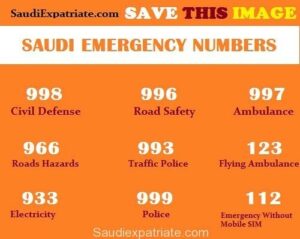
Professional Development: The country is undergoing significant economic and social transformations as part of its Vision 2030 program, which aims to diversify the economy and promote knowledge-based industries. Therefore, it’s essential for newcomers to continually enhance their skills and knowledge to stay competitive in the evolving job market. Engaging in workshops, training programs, and networking events can be beneficial for personal and career growth. Furthermore, actively seeking mentorship and guidance from experienced professionals can be highly advantageous. Demonstrating a commitment to professional development not only benefits the individual but also aligns with Saudi Arabia’s vision of a more educated and skilled workforce, positioning newcomers for success and opportunities in the Kingdom.

Newcomer Don’ts
Avoiding culturally sensitive actions and practices is essential for a positive professional experience. Some professional don’ts include refraining from public displays of affection, as physical contact between unrelated men and women is generally discouraged. Criticizing the Saudi government or the royal family should also be avoided, as these topics are highly sensitive. Additionally, using inappropriate or offensive language is strictly discouraged. It’s important to be cautious about discussing religious or political matters, as these can be contentious subjects. Alcohol is prohibited in Saudi Arabia, so consuming or possessing it is illegal. Lastly, while socializing with local colleagues, it’s best to follow their lead regarding customs, such as accepting or offering food and beverages. Being mindful of these professional don’ts helps newcomers navigate the Saudi work environment with cultural sensitivity and respect.

There are several important professional don’ts to be aware of to ensure a smooth and respectful integration into the local work environment:
Public Displays of Affection: Public Displays of Affection (PDA) are a notable professional do for newcomers in Saudi Arabia. Physical contact between unrelated men and women, including handshakes, hugging, or other forms of PDA, is generally considered inappropriate in the conservative Saudi culture. It is essential to exercise discretion and respect local norms when it comes to personal interactions. In professional settings, it’s advisable to be particularly cautious and to follow the lead of your Saudi counterparts, as displaying a PDA can be seen as a breach of cultural boundaries and may lead to misunderstandings or discomfort.
Criticizing the Government or Royal Family: The kingdom has stringent laws regarding defamation, and any public criticism or negative comments directed at the government or members of the royal family can have severe legal consequences. The Saudi society holds deep respect for its leadership, and any perceived disrespect is taken seriously. Therefore, it’s important for newcomers to exercise caution when discussing political matters and to avoid making any critical comments about the government or the royal family in both personal and professional contexts.
Inappropriate Language: Maintaining a respectful and courteous demeanor is highly valued in the Saudi business culture. This includes refraining from using offensive or vulgar language, making inappropriate jokes, or engaging in any form of disrespectful communication. Such behavior is considered unprofessional and can lead to negative perceptions and strained professional relationships. It’s important to maintain a high standard of professionalism in both verbal and written communication and to be mindful of the impact that inappropriate language can have on your image and reputation in the Saudi workplace.
Religious and Political Discussions: These topics are highly sensitive and can be contentious in this deeply religious and conservative country. Saudis have a strong attachment to their religious and political beliefs, and it’s best to avoid discussing or expressing opinions on these matters in a professional setting. These conversations can lead to misunderstandings or discomfort, potentially harming your relationships with colleagues or clients. Instead, it’s advisable to focus on business-related topics and to be respectful of the diverse perspectives that exist in Saudi society.
Alcohol Consumption: The Kingdom strictly prohibits the possession and consumption of alcohol, and these activities are illegal under Saudi law. Violations can lead to severe legal consequences, including fines, imprisonment, and even deportation. As such, it is crucial to abstain from any involvement with alcohol in the country. Recognizing and respecting this cultural and legal norm is not only essential for staying within the bounds of the law but also for maintaining a positive and respectful image in both personal and professional contexts.
Disregarding Local Customs: The Kingdom has a rich and deeply rooted culture, and showing respect for local customs and traditions is essential. Whether it involves accepting or offering food and beverages during social interactions or understanding the significance of hospitality and greetings, adherence to these customs demonstrates cultural sensitivity and courtesy. Failing to respect local traditions can lead to misunderstandings or perceived disrespect, which may harm professional relationships and hinder effective communication. Therefore, it’s crucial to familiarize oneself with local customs and follow the lead of Saudi colleagues to ensure a more harmonious and respectful professional environment in the Kingdom.
